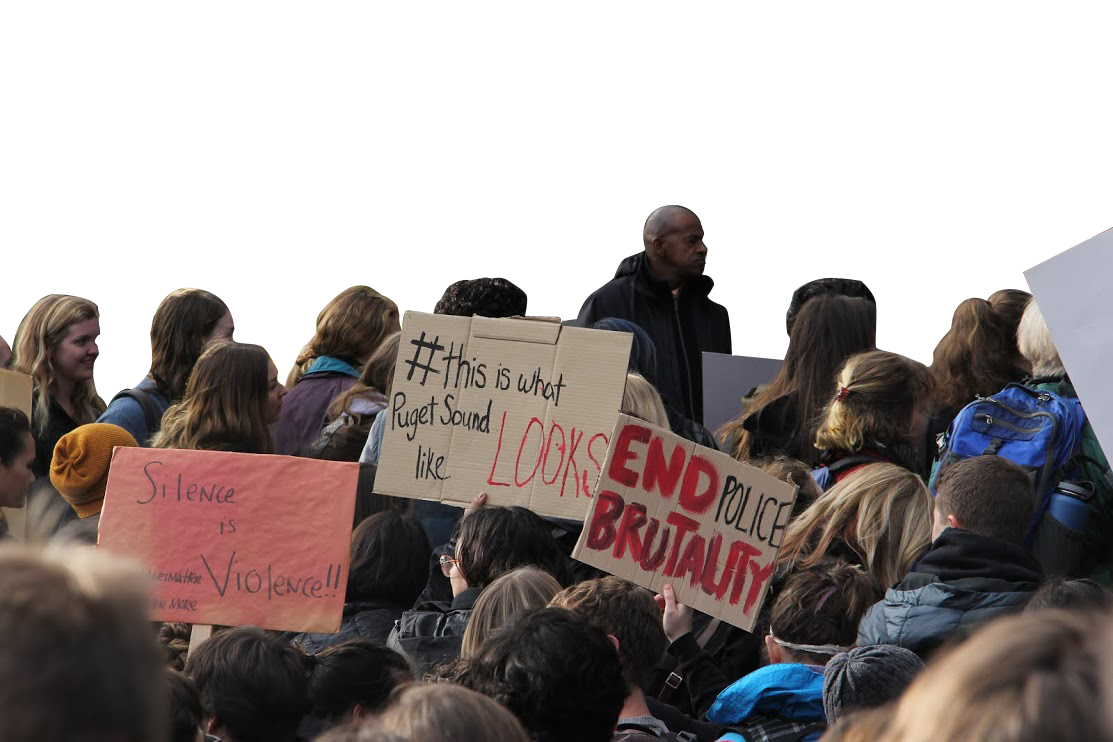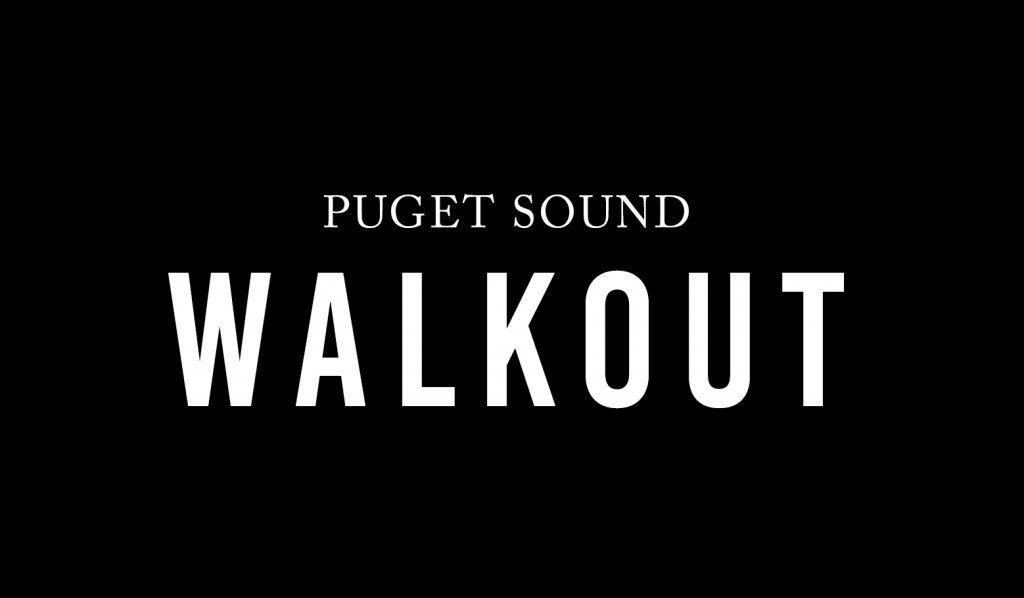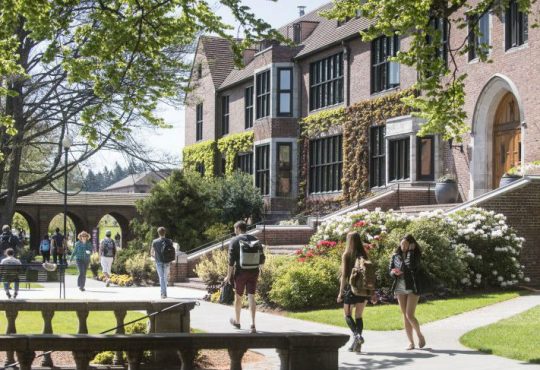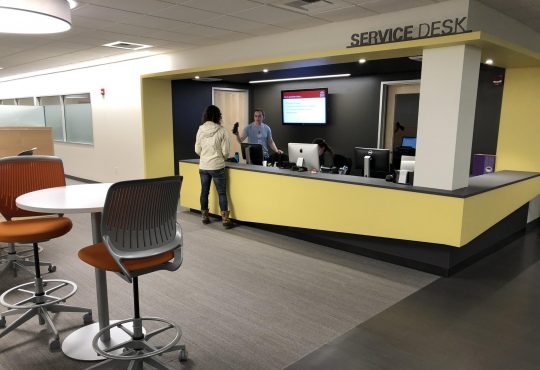By Ella Frazer and Casey O’brien
Organizers estimated that over 450 Puget Sound students and faculty walked out of their classes on Thursday, Nov. 19, to stand in protest and advocate for improving treatment of marginalized identities at the university and nationwide.
The rally took place on the steps of Jones Hall and was organized by the Advocates for Institutional Change (AIC), a coalition of groups on campus calling for an array of diversity- and inclusivity-related institutional changes.
The walkout was held in solidarity with marginalized students at universities across the country, such as Occidental, the University of California at Los Angeles (UCLA), Yale and the University of Missouri (Mizzou) to put pressure on the University to provide more resources for students from historically marginalized identities, according to flyers advertising the event.
“AIC’s vision for Puget Sound is that we would be a campus broken together, so we could learn together, and build together, and be strong together,” Rachel Askew, President of the Black Student Union (BSU) and member of the AIC, said of their goals.
The group drafted 12 demands for the administration to meet, and the demands were read at the rally by students, who also shared their narratives relating to each of the demands.
“Having these demands paired with narrative means they are nonnegotiable—they have to happen for the welfare of our students,” Askew said.
The demands included a new cultural center where Warner Gym now resides, and more inclusive and intentional enrollment and faculty hiring practices.
The full list of demands can be found in the Nov. 20 issue of The Trail.
The AIC stated that they would not leave the steps of Jones Hall until they received a phone call from President Ronald Thomas stating when he would meet with members of the group, as he was travelling on the day of the rally and therefore was unable to respond in person. The group did recieve a call at the rally and met with President Thomas Monday, Nov. 23.
The coalition formed out of responses to events happening across the country at universities like Mizzou and in response to the president’s email after the Speak Out in the S.U.B. the week of Nov. 9, where members of BSU, Latinos Unidos and other identity-based clubs spoke out publically about the effect of institutional discrimination on their lives. The Speak Out was paired with a “black out,” in which students were encouraged to wear black in order to stand in solidarity with Mizzou and students of color across the counrty. The events were advertised primarily through social media, especially the Puget Sound Student Union’s Facebook and Instagram pages.
“Last week with everything that was happening across the country with Mizzou and other universities, essentially we saw a power in the student body, and the backlash that came from that really inspired us to stand in solidarity with those students [at Mizzou] to let them know that they made the right decision,” Askew said. “Whether or not they saw it, we needed to make a statement that said, ‘You were right in going on a hunger strike so that this president would resign.’ And in doing that, we were able to create a sense of urgency on our own campus, and we didn’t want that to be quashed, and the email from the administration the next day kind of did that, it kind of quashed a lot of urgency by saying things like, ‘We’re doing these things, we have this person as ASUPS president, and all this stuff is happening, even if we’re not funding it, it’s still happening, so we don’t really have a problem,’ and that really hurt a lot of marginalized students on this campus.”
The frustration prompted a meeting Sunday, Nov. 15, organized by many of those who had spoken in the S.U.B. Members and presidents of many identity and cultural groups on campus were invited to the meetings, and the people who came that night formed the coalition now called the AIC.
“That inspired us to get together,collaborate and say, ‘That email was not enough, the things in that email were not enough, our ASUPS president is gonna graduate, what are you gonna do then?” Askew said.
The walkout was organized within five days of that initial meeting.
Advertising for the walkout was largely carried out through word of mouth until the night before the event, in order to protect the AIC from having the administration prevent the walkout.
“Another really important thing to remember about this is that it isn’t just one group of students, it’s across all identity and culturally based clubs on campus, and non culturally and identity based groups, like Peer Allies, [and] religious clubs,” President of Latinos Unidos Amanda Diaz said. “We’re all so tired of how the university is treating our students, and our friends, and our peers. It’s across the board… [in] different pockets across campus. It’s not just the angry brown kids, you know?” Diaz said.
The AIC invited a variety of student groups to their initial meeting following the president’s email and then together talked about concerns and came up with a list of pressing demands.
AIC member Jensen Handwork acknowledges that the 12 demands do not encompass every student’s needs, or even everything discussed at the initial meeting.
“We came up with like 40, easy, and could have had more, but we were like, we can only keep this to a couple hours’ meeting, so once we had these 30, 40 demands up on the board, which were very wide-ranging—a lot of different needs across campus—we started narrowing it down, because you can’t present a list of 30 demands to a university and expect them to be able to meet each one of them,” Handwork said.
The group plans to meet once a month, tentatively on Sunday evenings and urges interested students to attend. AIC encourages all students to become involved, especially beyond social media.
“Are you willing to move beyond the Facebook posts and the one time attending the walk out? That’s my challenge to Puget Sound students: come with us… because we will need them again, we need them every day,” Handwork said.
AIC has also been discussing the roles of students from dominant background in supporting marginalized students. “Start doing some research,” Askew said. “You can’t take up space if you don’t know what you are talking about.”
“If you want to be involved, go do your homework, because we want you involved, but if you don’t have the initiative to do your homework then you can’t be. Not because I said it, but simply because you don’t know how,” Askew said.
“That could also come from the white allies talking to other white allies,” Diaz said. “Because it shouldn’t be, for example, Rachel’s and I responsibility… [The burden shouldn’t be] put on top of people of color that always have to reaffirm the space and always have to be like, yes, my voice matters.”
“Learning is such a process and we have to respect where people are in their process,” Handwork said. He cautions, though, that that does not mean activists at Puget Sound should stop working toward educating their campus community. Handwork urges allies to take risks, because the work they are doing to support marginalized voices is work that matters.
“If there is an injustice happening to any human being… that needs to connect to your identity,” Handwork said. “You need to find some way that it does. Once you get that, that should be used as a platform to get you into the conversation. You need to do your homework so you don’t take up space that you shouldn’t, but you need to be able to take risks.”
An ally should also center their work around the voices that they are trying to support, and that includes understanding the legitimacy of personal experiences.
“If [a marginalized individual] goes to you to tell you why they are feeling this way, there is a reason they are going to you,” Diaz said.
“This idea, that I think is a problem on a lot of liberal arts campuses, of feeling uncomfortable and needing to take space to not be uncomfortable, it’s a privilege in itself to be able to opt in and out of discomfort. For some people, [discomfort] is their life every single day. [As an ally] I am choosing to feel discomfort and I don’t have to… so acknowledging when you feel that discomfort that’s a good thing to sit through because this is people’s lives every single day,” Katz said.
Askew emphasized the importance of discomfort within activism. Creating change is going to be hard, she emphasized, and it is a process that the campus must go through together.
“Know that you’re not really an ally so much as you’re becoming an ally, because you’re constantly learning, you’re constantly stretching yourself,” Askew said. “I think that we get confused in thinking that an ally is just somebody who lends a hand in a moment, when in fact a true ally bears the burden alongside of somebody and takes on more weight than that person, because that person bears that weight their whole life.”





